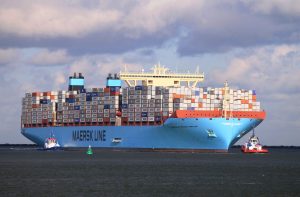In a sudden turn of events shipping behemoth Maersk is looking to breathe life back in to recently bankrupt competitor Hanjin as well as struggling Hyundai Merchant Marine Co. Rumors of a possible takeover have sent Hanjin stocks up more than 19% (Splash 24/7, 2016) and raised hopes that Hyundai’s shares will begin a slow recovery from being down 80% YTD (Bloomberg, 2016). These proposed mergers would increase Maersk’s already industry leading market share to a total of around 20%.

However, many of Hanjin’s customers have already jumped ship to Maersk, seeking a well-established and financially stable company to do business with after the nightmare of having their cargo stuck at sea. This reflects that Maersk is already taking some of Hanjin’s market share and does not need to acquire Hanjin to gain dominance. Also, when Maersk took over P&O Nedloyd in 2005 its market share surged at first but eventually only climbed a mere half of P&O Nedloyds total share. Maersk cannot assume that it will gain 100% of Hanjin and Hyundai’s business through these takeovers. Most importantly, Maersk must ensure that by acquiring Hanjin and Hyundai—and therefore their debts—they do not put themselves in a position where they will become financially unstable.
On the plus side, by acquiring competitors Maersk will increase its fleet capacity while avoiding constructing new ships. In doing so, Maersk could generate additional revenue and market dominance while avoiding further flooding the shipping market with excess capacity. This will be a change in strategy from the last ten years during which shipping companies have been in an arms race of expansion. The increase of supply in the market has driven down prices and therefore led to the current situation of many companies struggling to cover costs. The purchase of two Asian shipping companies will allow Maersk to expand its overall trans-pacific operations—an area where they are currently weak. Furthermore, the inherent redundancies of merging operations will allow for cost cutting and may help relieve the stress placed on Maersk by decreasing prices. It is important for Maersk to cost minimize as they are in an industry in which differentiation is very difficult and therefore should adopt Porters Generic Strategy of cost leadership. Maersk is currently position well to employ this strategy as it is not struggling financially as many of its competitors are and can improve its efficiency post-merger by cutting jobs.
In conclusion, there is a wide variety of benefits and disadvantages for Maersk to consider before attempting to acquire Hyundai and Hanjin. In an industry as currently unstable as theirs one bold step could send Maersk tumbling from its current dominance or soaring to new heights.
Sources:
https://www.bloomberg.com/gadfly/articles/2016-09-27/maersk-should-steer-clear-of-hanjin
http://www.bloomberg.com/quote/117930:KS
http://www.bloomberg.com/quote/011200:KS
Word Count: 449
